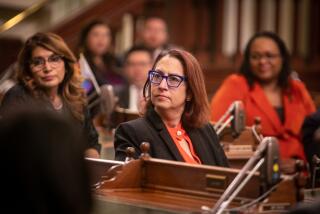The Why of Disclosures
- Share via
Assemblyman Gil Ferguson (R-Newport Beach) is the latest, and we suspect will not be the last, politician caught failing to disclose his financial interests in accordance with state law governing elected officials.
We say caught because the fact that Ferguson failed to report more than $10,000 in income that he received last year from the Costa Mesa development firm of C.J. Segerstrom & Sons Co. was discovered, and acknowledged by Ferguson, after he was questioned by Times reporters.
The reporters were investigating charges filed with the Orange County district attorney by a Newport Beach slow-growth advocate, alleging that Ferguson had filed false financial disclosure statements. The district attorney referred them to the state Fair Political Practices Commission.
Ferguson said he was “sorry as hell” and was going to immediately file an amended report. That’s pretty much what other elected officials have said and done when it became public knowledge that they had not fully complied with the state statutes enacted to allow the public to see the sources of a politician’s significant income. The disclosures help people determine whether any existing or potential conflict of interest exists.
The law calls for civil fines for legislators who fail to make the required financial disclosures.
We’re not doubting Ferguson’s explanation that he was unaware that he had to report the source as well as the income (which involves an undisclosed amount estimated to be about $20,000) and ascribe no sinister or illegal motive to his admitted violation.
But whether Ferguson meant to hide the source of the money that Segerstrom paid to a communications firm of which Ferguson is the sole owner, or the payment went unreported because of ignorance of the law, doesn’t change the fact that the public was deprived of the knowledge the law required it to have.
We shudder to think of how many other payments to how many other politicians that should have been disclosed remain unreported, for whatever reason.
The state is continuing to investigate Ferguson’s lapse and the charges that the unreported payment was intended to subsidize work the legislator later did for two successful Costa Mesa City Council candidates who subsequently cast key votes for a major Segerstrom commercial development.
Ferguson, a well-known advocate of private property rights and growth, denies the allegation and that his work for Segerstrom had anything to do with an unsuccessful bill Ferguson introduced to make it more difficult to enact local growth-control ordinances. He contends that Segerstrom hired his communications company to help establish an identity for the developer’s South Coast Metro project around South Coast Plaza in Costa Mesa.
That may all be true, but at best, even if his association with Segerstrom is within the letter of the law, it raises the suspicion of conflict of interest, which any prudent politician should scrupulously avoid.
If nothing else, the Ferguson case points out the need for more aggressive monitoring and enforcement of the California Political Reform Act. Elected officials cannot fail to comply with its reasonable and necessary disclosure requirements out of ignorance, figuring that they can just file an amended report if they are caught in a violation. The reform act sets up rules of the road for professional politicians. They are obligated to know those rules--and follow them.
More to Read
Sign up for Essential California
The most important California stories and recommendations in your inbox every morning.
You may occasionally receive promotional content from the Los Angeles Times.










